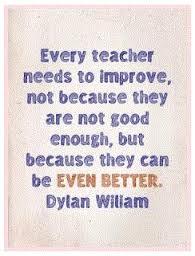Peer to Peer Observations: Lessons Learned
Lark S. EscobarThis academic year, I’ve had the opportunity to visit some of my peers’ classes on ordinary days. I wanted to gain exposure to the students’ abilities and behavior at different points of the spectrum, get a feel for what the classroom tasks were like, and see what strategies were being used by my colleagues to address various classroom management issues, such as L1 infiltrating the classroom. 
Peer support via observation opportunities can be very beneficial and offer rich opportunities for reflection. Here are my notes from the informal observations.
Classroom Observation 1: (Level 4)
Students who were late did not disrupt class. They sat down and looked at the board to see where the students were in the lesson. The teacher did very little talking and it was clear the students were used to various routines and expectations. Students were not off-task, they concentrated on their IELTS prep task and asked questions. This class was very efficient, orderly, and calm.
Classroom Observation 2: (Level 3)
Students who were late were immediately engaged in the lesson, eager to join in to what they were missing out on. The class was joyful, as the teacher naturally used humor to maintain student interest, correct behavior, and deliver instruction. It felt easy to be in this room, the teacher deters Arabic speaking by tallying incidents to “earn” the class additional homework activities. This class was very cheerful, entertaining, and inclusive.
Classroom Observation 3: (Pre-Foundations)
Students in this room were a bit shy. The class size was smaller, which really made a big difference for the teacher. The teacher was very clear in expressing expectations and redirected if students were speaking Arabic. The lesson was very logical and well organized. The learners worked in groups or pairs on their tasks, which worked really well, in addition to whole-class checking for understanding. It was a very dramatic difference to see the language output compared to my students (level 2) or the level 3 and 4 students I had previously observed.
Lessons Learned
I was only able to do these observations with my peers because they trusted me to not exploit the  opportunity for some untoward purpose. They knew I was there to gain insight into the bigger picture of HCT and also think through challenges I was struggling with in my own classroom management. I loved having the opportunity to observe and sit and think and see how others put ideas into action. It renewed my energy and inspired me to experiment with new approaches I hadn’t tried with my learners. I met with success as my learners responded positively to these practices.
opportunity for some untoward purpose. They knew I was there to gain insight into the bigger picture of HCT and also think through challenges I was struggling with in my own classroom management. I loved having the opportunity to observe and sit and think and see how others put ideas into action. It renewed my energy and inspired me to experiment with new approaches I hadn’t tried with my learners. I met with success as my learners responded positively to these practices.
The most significant lessons learned were when I realized that the opportunity to observe my peers  resulted in a positive impact in my classroom, and also the perspective to see how things work together in my department.
resulted in a positive impact in my classroom, and also the perspective to see how things work together in my department.
On the other hand, while peer to peer observations can be very valuable, they can damage relationships or strain cooperation if they are poorly timed, or done in a critical spirit. The rich stimulation I experienced as an educator was possible because everyone participating was doing so voluntarily and with trust. Having an observer can be fun, but it can also be stressful for both the teacher being observed and the students. If over-used or used improperly, it can interfere with instruction or ruin the atmosphere of a class.
 In a previous position, I was responsible for conducting observations, evaluations, and teacher training for a language department. I found that everyone was nervous to the point where instruction bordered on disastrous if the observations were not scheduled in advance. Some weeks are too busy, due to absence, assessment schedules, or holiday interference. It is really important to make sure that peer observations give the same considerations priority. Teachers were more than willing to invite observations for days when they were not under pressure for other reasons.
In a previous position, I was responsible for conducting observations, evaluations, and teacher training for a language department. I found that everyone was nervous to the point where instruction bordered on disastrous if the observations were not scheduled in advance. Some weeks are too busy, due to absence, assessment schedules, or holiday interference. It is really important to make sure that peer observations give the same considerations priority. Teachers were more than willing to invite observations for days when they were not under pressure for other reasons.
I found it was also very helpful to assure the teachers that I was there to showcase their strengths. No one likes to feel like they are under a magnifying glass! Allaying fears, and being worthy of trust also create an atmosphere of true partnership and collaboration that benefits both the educators and the learners involved. Not everyone is comfortable having peers observe their class, so if you find that someone is hesitant to have a visitor, make sure that they feel welcome to come visit yours. By sharing our strengths and affording opportunities for reflection and collaboration, we can all strengthen and support one another. Thanks to those who were willing to host me this year!
